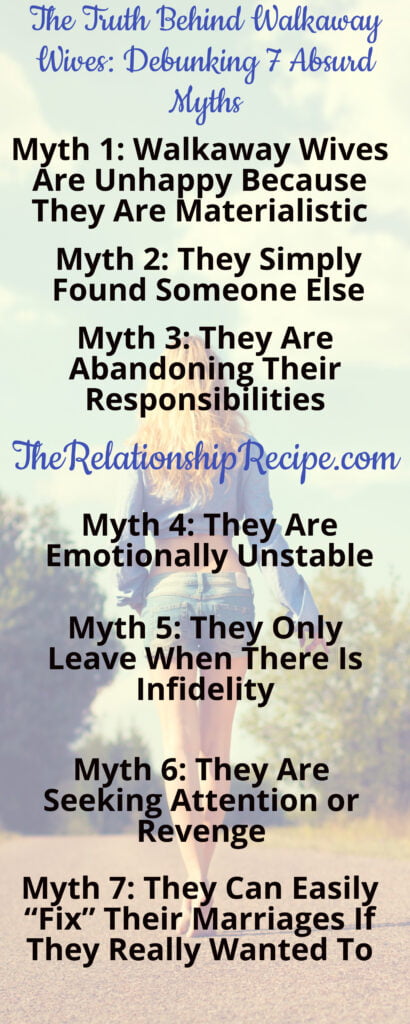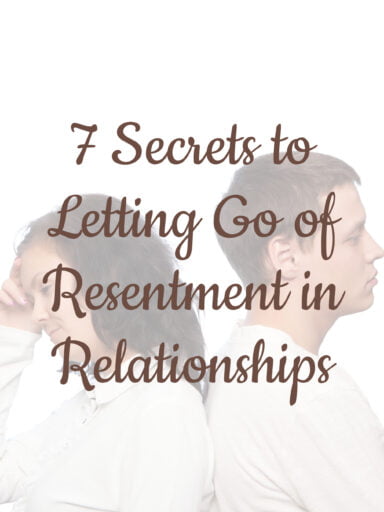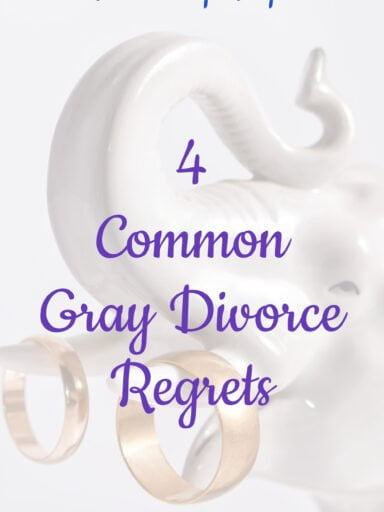In recent years, the term “walkaway wives” has gained prominence in discussions about marriage and divorce. These are women who, after careful consideration or “sudden” realization, decide to end their marriages. I put “sudden” in parentheses because it is anything but sudden.
It often takes women years to come to this difficult choice.
Before getting to the “meat and potatoes” of this article, I wanted to go over what walkaway wives are – and what they are not, but first, why does this phrase raise hackles on some women? Let’s discuss…
Walkaway Wives: Why the Term is Offensive to Some Women
The term “walkaway wives” can be offensive to some women for several reasons, many of which are rooted in its implications and the societal context surrounding gender roles and marital expectations:
1. Blame and Oversimplification: The term often implies that the wife is solely to blame for the breakdown of the marriage because she “walked away.” This oversimplifies complex marital issues and ignores the contributions or failings of both partners.
2. Victim-Blaming: It can perpetuate a narrative that the woman is selfish or irresponsible for leaving, without considering the reasons why she felt compelled to leave—such as emotional neglect, abuse, or a lack of mutual effort to resolve issues.
3. Gender Stereotypes: The term reinforces traditional gender stereotypes that women should be the caretakers of relationships and are responsible for making them work, even at the expense of their own well-being.
4. Neglect of Emotional Labor: Many women in troubled marriages have often invested significant emotional labor and effort into trying to resolve issues before deciding to leave. The term dismisses this work and the emotional toll it takes.
5. Minimizing Abuse and Neglect: For women who leave marriages due to abuse, neglect, or controlling behavior, the term can be particularly offensive as it trivializes their experiences and the serious reasons behind their decision to leave.
6. Lack of Agency: It can also imply that women don’t have the right to make decisions for their own well-being and happiness, reinforcing the idea that they should stay in unsatisfying or harmful relationships.
7. Narrative Control: The term often comes from a perspective that overlooks or minimizes the woman’s side of the story, thereby controlling the narrative in a way that can be dismissive and unfair.
For many women, leaving a marriage is a difficult and often last-resort decision made after considerable thought, effort, and emotional struggle. Labeling them as “walkaway wives” can feel like an unjust critique that fails to recognize their experiences and the complexities involved.
Women also get irritated at how it sounds — as if she just willy-nilly woke up one day and decided to divorce! However, the phrase is tongue-in-cheek, and is really meaning just the opposite.
The majority of women who leave have not made this decision lightly, often taking years to decide, after trying, crying, cussing, and everything else in their power to save the marriage from imploding. This is after trying for years to be happy in it.
I cannot stress this fact enough.
If a woman is not ready to leave right away once coming to the realization that the marriage is failing, she may get suddenly quiet. She will stop asking for things to be done about the issues with the relationship, the fights may cease, and according to a clueless husband, everything is juusst fine and dandy! She stops “nagging” him, or even talking to him, and he’s happy with this because he can now do as he wants!
Since it sometimes takes years to leave, when she finally drops the “D” word on him, seemingly out of the blue, it may look to the husband, and those outside the marriage, as if it came on “all of a sudden.”
As I have mentioned in another article on walkaway wives, I do not know of ONE woman who took leaving her marriage lightly. They just didn’t see any other option. It’s a tough spot to be in, with many key questions she will need to ask herself before taking the plunge into divorce.
On the other hand, I also don’t know of any women who regretted their decision. The majority of them admitted it was hard to do, and that the process terrified them, but that they are much happier now after the dust settled. They express that the only regret they have is not ending it years prior to actually leaving.
This phenomenon has sparked a wide range of reactions from society, ranging from sympathy to judgment. However, many of the perceptions surrounding walkaway wives are rooted in myths that do not accurately represent their experiences or motivations.
In this article, I will debunk seven common and absurd myths about walkaway wives, and the complex realities they face.
Myth 1: Walkaway Wives Are Unhappy Because They Are Materialistic
Truth: The decision to leave a marriage is rarely as superficial as a desire for material possessions. Walkaway wives often experience deep emotional dissatisfaction, feeling unfulfilled and disconnected from their partners. Their decision is more about seeking emotional and psychological well-being than about acquiring material wealth.
What’s more, women leaving their marriages typically experience a large percentage drop (up to 40%) in income, while men usually gain 10% — 20% financially! So, this myth is totally absurd.

Myth 2: They Simply Found Someone Else
Truth: While it’s true that some walkaway wives may develop new relationships after leaving their marriages, it’s misleading to assume this is the primary reason for their departure. Most often, the decision to leave is the culmination of long-standing issues within the marriage, not the impulsive pursuit of a new romance.
I used to be a content contributor to a news app called Newsbreak. The readers there are mostly Boomers and Gen-X. The comments could get nasty and vicious. Some male commenters on my articles were “something else,” to put it mildly.
It was a real eye-opening look into how many men still think, and they didn’t have any qualms about holding back showing how ignorant they were of what women want and need. My article on walkaway wife syndrome really seemed to raise their ire, and the bitter-boy club came out in full force. Probably because they took the term walkaway wives literally and didn’t like what they saw, after skimming my article and seeing what it really means.
It also gets real obvious who actually read the article and who did not.
The male commenters, who couldn’t be bothered to read the article and only the title, made comments like “she left me so she could go ride the C@ck Carousel.”
LMAO!
Yeah, Sport, she couldn’t possibly have left your ass because you’re an emotionally stunted blockhead! It was as if they were SHOCKED that a woman actually wants to leave because they are miserable being married to that kind of man, who lives in a world where sex, and thoughts of sex dominate his every decision. In his mind, it HAS to be that she’s just a sex-crazed slut. That’s why she left! I gave her everything!
Yeah, everything but what she was really asking for — like maybe some respect, some autonomy, and maybe to be heard once in a while.
It’s not that difficult.

Myth 3: They Are Abandoning Their Responsibilities
Truth: Leaving a marriage is a profound and difficult decision, especially for women who have invested years in building a life with their partners and raising children. Walkaway wives do not see themselves as abandoning their responsibilities, but as redefining them in a way that aligns with their personal and emotional needs.
Lack of equal distribution of household duties is a real issue in marriages today, and you can take it to the bank that many marriages have ended for this issue alone. She may have come to view her husband as a grown child she still has to take care of, and clean up after on top of everything else.
Or maybe he’s just a dead weight who expects a medal for unloading the dishwasher or helping with the kids-HIS kids. She may feel that she does it all anyway, so why put up with being in a shitty, unfulfilling marriage on top of everything else? What does she have to gain by staying?

Myth 4: They Are Emotionally Unstable
Truth: Yawwwnnnn. The old “you’re crazy” insult that men say when you do or say something they don’t agree with, or have reached the end of your rope with his bullshit and finally reacted to it. Don’t fall for this! The decision to end a marriage is a sign of emotional maturity, not instability.
Walkaway wives often exhibit a high level of self-awareness and emotional intelligence, recognizing that staying in an unhappy marriage is detrimental to their mental health and overall well-being.

Myth 5: They Only Leave When There Is Infidelity
Truth: While infidelity can be a factor in some marriages that end with one partner walking away, it is not the sole reason. Many walkaway wives leave due to emotional neglect, lack of communication, or irreconcilable differences that have nothing to do with infidelity.
Yes, no one will blame a woman for leaving due to infidelity — but since that’s not the case in all situations, it makes it much easier to judge her when there was no cheating. Just neglect, abuse and everything else with the kitchen sink!
As if cheating is the only reason a marriage should break up. Sorry Buddy — yer d!ck ain’t that big!
Pfft…

Myth 6: They Are Seeking Attention or Revenge
Truth: The decision to leave a marriage is deeply personal and often painful. Walkaway wives are not motivated by a desire for attention or revenge but by a genuine need for change and personal growth. Their actions are driven by self-preservation and the pursuit of happiness, not malice.
If she tells her husband she wants a divorce, believe me, she isn’t out for revenge — she just wants out.

Myth 7: They Can Easily “Fix” Their Marriages If They Really Wanted To
Truth: Marriages require effort from both partners. However, when one partner feels that their concerns are consistently ignored or invalidated, the foundation of the marriage erodes. Walkaway wives have often attempted to resolve marital issues to no avail, leading them to conclude that leaving is the only viable option for their personal well-being.
Many men use the excuse that they didn’t see it coming, or at least that’s what they tell people outside the marriage. I don’t believe that for a second. There are ALWAYS clues, but the guy was not in tune with the relationship to notice the growing chasm between themselves and their wives.

Conclusion
Walkaway wives challenge the traditional narratives about marriage and commitment, forcing society to confront uncomfortable truths about relationships. By debunking the myths surrounding these women, we can begin to understand their experiences more empathetically.
Their decisions are not made lightly but are the result of complex emotional and psychological processes. It’s time to move beyond judgment, and support these women as they navigate the challenging path of redefining their lives on their own terms.
https://www.psychologytoday.com/us/blog/divorce-busting/202209/the-walkaway-wife-syndrome-revisited
This post may contain affiliate links. I earn from qualifying Amazon purchases at no extra cost to you.




